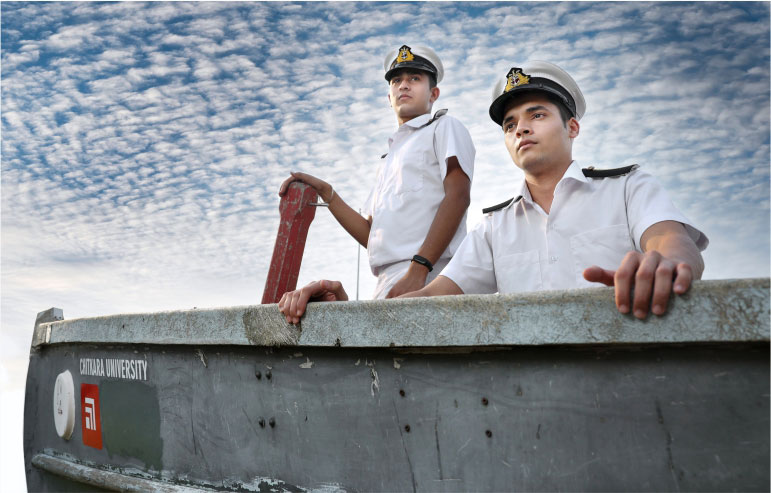If you want to have a successful marine career, you must make the right decisions from the start. It is typical for new students at a maritime college to be uncertain about which path to choose for advanced coursework, especially if they have no personal connections to the industry.
After earning a degree or diploma in nautical science or marine engineering, one can seek officer jobs aboard merchant ships. There have been instances where someone has decided on a certain stream only to find out later that it does not fit their academic preferences or their chances of success at sea, leading them to reconsider and pick a different one.
Also Read: Top Ranking Engineering College In India
Therefore, it is crucial to decide what career path one wants to take and what role they will play on the ship in the future. One can become a deck officer after pursuing a profession in nautical science.
The three-year B.Sc. Nautical Science program at Chitkara University offers an undergraduate degree as well as a post as a trainee cadet officer on a ship (commonly referred to as a deck cadet).
After spending enough time at sea (the length of experience/sea time required as a deck cadet varies based on the undergraduate program) and passing pertinent certificate of competency examinations, the cadet is qualified to operate as a navigating officer on board a commercial ship.
Students study seamanship, chart work, collision avoidance, navigation, bridge equipment and watchkeeping, cargo handling and stowage, ship stability, naval architecture (elementary), meteorology, marine signalling, and ship maintenance and operation, among other topics, over the course of the three-year program.
Also Read: Job Opportunities After Nautical Science In India
This training contains specialised methods and maintenance techniques for important deck gear since practical experience is crucial for deck officers. The IMO STCW Convention’s mandatory nautical science curriculum consists of a number of modular courses that must be completed before joining a ship. The technical facets of the maritime industry are addressed by the discipline of marine engineering.
The machinery on ships, boats, yachts, and other seagoing vessels is the focus of marine engineering. Other technological streams have emerged from this topic. The curriculum of the course places a strong focus on acquiring specialised knowledge in both theoretical and practical facets of mechanical and marine engineering.
Teaching the knowledge and skills necessary to operate and maintain shipboard machinery is given more importance. Nearly similar principles to those covered in standard mechanical engineering courses are taught in the first and second years of the curriculum. The main objective is to educate students about engineering sciences and show them how they are used in many aspects of maritime engineering.
Utilizing the students’ maritime technical skills is the only focus of the third and fourth years. With a focus on ship operation and maintenance, both theoretical and practical elements of maritime equipment are taught.
Also Read: How To Become A Marine Engineer?
Students gain practical expertise through laboratory and workshop teaching throughout the course of the four-year program, enabling them to disassemble and maintain shipboard equipment.
The engineer cadet must spend the necessary time at sea after finishing the training at the Institute in order to get the experience needed to pass the engineering certificate of competency exams. You must pass these tests in order to obtain the necessary “ticket” to serve as a qualified engineer officer on board.
A cadet studying nautical science must sail for enough time to have the necessary experience. The next step is to pass the necessary competency tests and get certified. After that, they can apply for a job as a navigating officer and embark a commerce ship.
The entry point for a career in this area is as a deck cadet or a trainee cadet officer. For a deck officer, this training provides precise instructions on how to operate and maintain key deck gear. It is feasible to advance from Junior Officer to OOW (Officer on Watch).
The initial promotion entails the designation of Third Mate or Junior Officer. The number of years of experience necessary for this position, however, may vary depending on the shipping firm. The use of charts, avoiding collisions, navigating, using bridge equipment, managing cargo, and other tasks all call for a combination of theoretical and practical expertise. Management skills are also imparted to them.
Most marine engineers work for private companies. They are in charge of creating new maritime vessels and parts through design, development, research, and building. They are also in charge of maintaining the ships’ structural integrity. Additionally, there are career opportunities in GSI, SAIL, ONGC, Coal India, GMDC, and other respectable businesses.
Also Read: What Is The Difference Between Nautical Science And Marine Engineering?
Both the position of a Captain at the helm and that of an engineer aboard a ship demand exceptional health and stamina. Chief Engineers graduate from courses in marine engineering, whereas Captains graduate from courses in nautical science. Both provide chances to get employment aboard ships and other seagoing boats. Excellent career prospects are available in the shipping sector, which has grown in significance over the past several decades. The industry significantly aids in the development and expansion of a nation’s economy.






